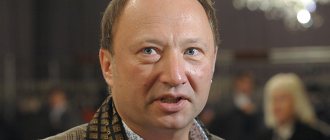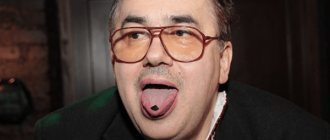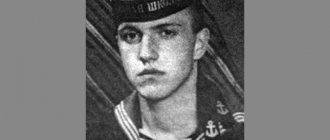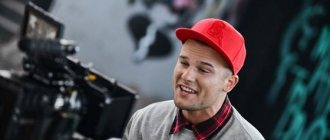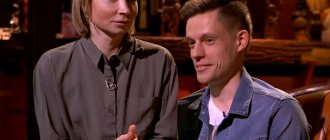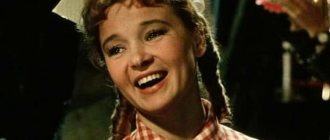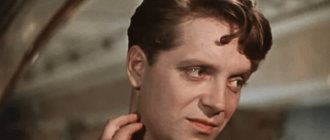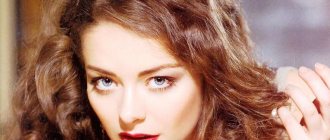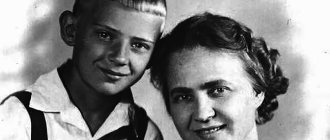| Yuri Kuklachev | |
| Birth name | Yuri Dmitrievich Kuklachev |
| Date of Birth | April 12, 1949(1949-04-12) (age 71) |
| Place of Birth | With. Podrezkovo, Khimki district, Moscow region, RSFSR, USSR |
| Profession | clown, trainer |
| Citizenship |
|
| Role | clown, circus performer, trainer |
| Awards | |
50-year-old Kuklachev (1999)
Yuri Dmitrievich Kuklachev
(born April 12, 1949, Podrezkovo, Khimki district, Moscow region [1]) - Soviet and Russian circus performer, carpet clown, cat trainer. Founder and permanent artistic director of the Cat Theater in Moscow since 1990[1]. People's Artist of the RSFSR (1986). Winner of the Lenin Komsomol Prize (1980).
Biography[ | ]
Born on April 12, 1949 in the village of Podrezkovo, Khimki district, Moscow region. Parents Dmitry Semenovich and Valentina Ivanovna were workers originally from the Chekhov district of the Moscow region [2].
Since childhood, I dreamed of becoming a clown. For seven years, every year he tried to enter the circus school, but without success[3]. In 1963 he entered Moscow Vocational School No. 3, where he studied to become a printer; worked at the Young Guard printing house. However, he continued to be faithful to his childhood dream and in the evenings he worked at the folk circus at the Red October House of Culture. In 1967 he became a laureate of the All-Union Amateur Show. At the final concert of the All-Union Review, held at the Circus on Tsvetnoy Boulevard, Yuri Kuklachev was noted by specialists and finally invited to the State School of Circus and Variety Arts[3]; The group's teacher was clown Nikolai Kiss. In 1971, Kuklachev graduated from a circus school with a degree in clown-parodist-acrobat and became an artist of the Union State Circus, where he worked until 1990. Kuklachev’s circus image is a simple-minded and crafty buffoon clown, a man of the people in a stylized Russian shirt. At first he worked under the pseudonym Vasilek[1].
Kuklachev is looking for his own “zest”, something that will distinguish him from other circus performers - and in the mid-1970s, a domestic cat appears in his performances for the first time[3]. Cats are considered extremely difficult to train animals - it is almost impossible to force them to do what they do not want to do. In order to achieve results in working with cats, you need to have knowledge of their habits, patience, the ability to note and take into account the individual capabilities of each animal and, with the help of positive motivation, activate them [4]. According to Kuklachev himself, he came to work with cats by accident: once on tour he picked up a stray kitten, which he took home and named Kutka. Observing the cat’s habits, Kuklachev decided to try to teach him circus tricks[5]. One day, when Yuri Kuklachev came home from work, he found Strelka, another cat that had appeared in the Kuklachevs’ house, sleeping in a saucepan. The clown pulled her out of the pan several times, but she stubbornly climbed back into her favorite place[5][6]. It occurred to Kuklachev, based on this behavior of the pet, to create a circus act, which he called “The Cat and the Cook” (the name refers to the fable of the same name by I. A. Krylov). Later, Kuklachev’s animal troupe was replenished with another cat - Romashka - and a Maltese named Pate. This made it possible to create new performances involving several animals[6].
Shows with trained cats brought Kuklachev all-Union fame; Soon they began to send him on foreign tours. In 1976, in Canada, he was awarded the “Golden Crown of Clowns” award and a diploma “For humane treatment of animals and promotion of humanism.” In 1980, Kuklachev was awarded the Lenin Komsomol Prize and the honorary title “Honored Artist of the RSFSR.” In 1985, at the prestigious International Circus Festival in Monte Carlo, Yuri Kuklachev was awarded the second award - “Silver Clown”[1][7]. In 1984, Yuri Kuklachev graduated from the theater studies department of the State Institute of Theater Arts[1]. In 1986, after the release of the “Circus in My Luggage” program, Yuri Kuklachev was awarded the honorary title “People’s Artist of the RSFSR”[1].
In 1990, the Moscow City Hall transferred to Kuklachev the building of the former Prizyv cinema on Kutuzovsky Prospekt, and on February 23, 1990, a private cat theater opened there [3] (the original name was “Cat House”, later “Kuklachev’s Cat Theater”). This is the first cat theater in the world[1]; In addition to cats, dogs also participate in reprises. In 1994, Yuri Kuklachev was awarded the Order of Friendship[8]. In 2005, the Kuklachev Cat Theater received state status. Over the many years of his career, Yuri Kuklachev has staged such performances as: “The Cat Thieves”, “Prince Nutcracker and the Rat King”, “Cats from the Universe”, “Queen of Cats”, “Circus in My Luggage”, “Cats, Clowns and Love”, “My Favorite Cats”, “Puss in Boots”, “Boris the Cat Olympics”, “Cat’s House”, “Ice Fantasy” and many others[1].
Yuri Kuklachev is the founder of the educational project “School of Kindness”[3], within which teaching aids have been developed for classes with children in primary school and children’s cultural, educational and entertainment events called “Lessons of Kindness” are held. Yuri Kuklachev regularly conducts “Kindness Lessons” in schools, children's institutions and even in children's correctional institutions in different cities of Russia[9][10][11][12]. In 2005, the Kuklachev family founded the Regional Public Fund for the Promotion of Cultural and Spiritual Education of the Young Generation named after Yu. D. Kuklachev[3]. He is a member of the Public Council under the Federal Penitentiary Service of Russia[13].
Training method
Watching the amazing circus acts of Yuri Kuklachev, watching how the cats love and obey him, the audience is probably perplexed how the artist managed to achieve such mutual understanding with the animals. Kuklachev claims that his secret is extremely simple. You need to be affectionate with animals and not allow rudeness, even if the tailed ones play pranks. He doesn't force the cats to do anything. Feeling a good attitude, they themselves show what they are capable of, and Kuklachev only develops these “talents”. Cats are not trained, but raised.
Kuklachev shared with reporters that he seeks an individual approach to each cat. He tries to grasp his character, notice his habits. It turns out that you can see as many as 34 expressions on a cat's face. He develops any skills in cats exclusively through the method of encouragement, because they obey a person only in order to receive a drop of warmth and love. You also need to be patient. It can take anywhere from several weeks to several years to prepare an animal for the stage.
What is the zodiac sign of Nicholas II and how did it affect the emperor’s character?
For any holiday I cook Turkish chicken. The family loves this dish
Russian nobles did not work, but where did they get the money and what did they spend it on?
Awards[ | ]
- 1976 — Golden Crown of Clowns (Canada) and diploma “For humane treatment of animals and promotion of humanism”
- 1976 - Goodwill Ambassador (Canada)
- 1977 - Honorary Member of the Clowns of America
- 1980 - Lenin Komsomol Prize - for great achievements in the field of the original genre of circus art
- February 14, 1980 - Honored Artist of the RSFSR
- 1981 - Golden Oscar Award (Japan)
- 1985 - Silver Clown prize at the International Circus Competition in Monte Carlo[7]
- June 9, 1986 - People's Artist of the RSFSR
- December 17, 1994 - Order of Friendship - for services to the people related to the development of Russian statehood, achievements in labor, science, culture, art, strengthening friendship and cooperation between peoples
[14] - 2008 — National Award “Imperial Culture” named after Eduard Volodin in the category “Children’s Book” for the series of books “Lessons of Kindness”[15].
- 2011 — Honorary Professor of the Moscow State University of Culture and Arts (MGUKI)[16]
- 2012 — Honorary Professor of the Belarusian State University of Culture and Arts (BGUKI)[17]
- September 9, 2020 - Order of Honor - for great contribution to the development of national culture and art, many years of fruitful activity
[18]
Family[ | ]
Father - Dmitry Semenovich Kuklachev (1924-1995). Mother - Valentina Ivanovna Kuklacheva (1928-2005).
Wife - Elena Isaakovna Kuklacheva (Gurina; born January 4, 1948 in Moscow)[1]. Yuri Kuklachev met his future wife in 1970, while still a student at the circus school[5]; Elena Gurina was a dancer who studied at the Studio of the Folk Dance Ensemble of I. A. Moiseev[19]. Soon they got married, Elena Kuklacheva began assisting her husband at performances; currently works at the Cat Theater.
The eldest son, Dmitry Yuryevich Kuklachev, was born on August 5, 1975 in Moscow. He graduated from the State School of Circus and Variety Arts in 1994 and the directing department of GITIS in 2002[1]. In 2009 he received the title “Honored Artist of the Russian Federation”. Artist and first deputy artistic director. Dmitry Kuklachev's wife Marina also works at the Cat Theater, an honorary artist in the city of Moscow.
Daughter Ekaterina Yuryevna Kuklacheva was born on November 18, 1980 in Moscow[1]. In 2003 she graduated from the Moscow State Textile University named after A. N. Kosygin[20]. The chief artist, deputy artistic director for general issues of the Kuklachev Cat Theater, draws cats.
The youngest son, Vladimir Yuryevich Kuklachev, was born in 1983 in Moscow. He graduated from the Academy of Ballet (class of P. E. Korogodsky), worked as a soloist at the Panov Ballet Theater in Israel. After finishing his career as a dancer, he worked as an artist at the Kuklachev State Cat Theater in Moscow[21].
Childhood and family of Yuri Kuklachev
The future famous trainer was born on April 12, 1949 in Moscow. Despite the common misconception, the parents of our today's hero did not belong to any famous circus dynasty and had nothing to do with art at all. The roots of his family must be sought in the Chekhov district of the Moscow region. It was there that most of the life of the parents of the outstanding clown was spent. Yuri himself was born after his father and mother received a prestigious appointment in the capital of the RSFSR. In Moscow, the parents of the future trainer worked as engineers.
Why Yuri Kuklachev decided to connect his life with the theater is known only to himself. Only in one of his interviews did our today’s hero briefly mention the “gray reality” that reigned in the post-war Soviet Union. Perhaps it was this dullness that pushed Yuri to the bright and cheerful art of circus, which later became his whole destiny.
Books[ | ]
| This section is missing references to information sources. Information must be verifiable, otherwise it may be questioned and deleted. You may edit this article to include links to authoritative sources. This mark was set on March 23, 2020 . |
Yuri Kuklachev with his book “Lessons of Kindness”, 2017
- School of Kindness
- Lessons in Kindness
- Yuri Kuklachev and his 120 cats
- My friends are cats
- Sprat, Strelka, Chamomile and Yurashka the clown
- Cats in Paris
- The most common chest
- cat house
- Spiritual Cooking
The accusations are meaningless
Trainers are often accused of cruelty to animals, believing that rehearsed performances are the result of rough treatment. Similar accusations were made against Kuklachev. But he reacts calmly to such statements. The artist simply invites everyone who accuses him to try subjecting the cat to harsh training. So a person will achieve nothing from this graceful and wayward animal, except painful scratches. In addition, cats are very vindictive. If a person offends the tailed one even once, he will no longer win his trust and affection. And since all tailed artists love their master and mentor very much, he cannot be blamed for treating them rudely.
Life doesn’t work out: why Harry and Meghan “endure” life in Los Angeles
Svetlana Svetlichnaya said that she has to celebrate her 80th birthday in the company of a cat
Pros of moving to Los Angeles: Megan celebrated Mother's Day with her mother
Notes[ | ]
- ↑ 1 2 3 4 5 6 7 8 9 10 11 Kuklachev Yuri Dmitrievich
- article from the Great Russian Encyclopedia - Kuklachev Yuri Dmitrievich
- ↑ 1 2 3 4 5 6 Anton Denisov.
Biography of Yuri Kuklachev
(unspecified)
. RIA Novosti (April 12, 2014). Retrieved December 16, 2017. - Novoselova S.
Independent cats // Science and life: magazine. - 1976. - August (No. 8). — P. 159. - ↑ 1 2 3 Nikiforova, Elizaveta.
Yuri Kuklachev: They wanted to plant drugs on me
(unspecified)
. Interlocutor (November 15, 2015). Retrieved December 16, 2017. - ↑ 1 2 Geraskina L. B.
Cats in the arena // Science and life: magazine. - 1976. - August (No. 8). - pp. 157-159. - ↑ 1 2 Shcherban V.
Golden somersault in Monte Carlo // Izvestia. - 1985. - December. - Decree of the President of the Russian Federation of December 17, 1994 No. 2197 “On awarding state awards of the Russian Federation” (unspecified)
(December 17, 1994). Retrieved December 16, 2020. - Yuri Kuklachev spoke in the Aleksin colony (undefined)
. Tula News Service (September 8, 2017). Retrieved December 16, 2020. - Kuklachev arrived in the Novosibirsk colony (unspecified)
.
https://novosib-room.ru
(November 22, 2016). Retrieved December 16, 2020. - Kalinkina, Margarita.
Yuri Kuklachev visited the Tyumen colony with a one-man show
(unspecified)
. Komsomolskaya Pravda (January 14, 2015). Retrieved December 16, 2020. - Lobanov, Dmitry.
A lesson in kindness from Kuklachev // State house. — 2014. — March (No. 5 (183)). — P. 2. - Composition of the Public Council under the Federal Penitentiary Service of Russia / fsin.su
- Decree of the President of the Russian Federation of December 17, 1994 No. 2197 “On awarding state awards of the Russian Federation”
- Imperial culture. Laureates of the Eduard Volodin Prize 2009 (unspecified)
.
rospisatel.ru
. Retrieved December 15, 2020. - Awarded the title of honorary professor of MGUKI (undefined)
(June 15, 2011). Retrieved December 16, 2020. - BGUKI: the university of our time (undefined)
.
buk.by.
_ Retrieved December 16, 2020. - Decree of the President of the Russian Federation of September 9, 2020 No. 430 “On awarding state awards of the Russian Federation”
- Yuri and Elena Kuklachev: he, she and cats (unspecified)
(July 5, 2017). Retrieved December 16, 2020. - Biography of Ekaterina Kuklacheva (unspecified)
.
kuklacheva.com
. Retrieved December 16, 2020. - Livesey, Elena.
Vladimir Kuklachev: People are not looked after the way we look after our cats
(unspecified)
. Komsomolskaya Pravda - St. Petersburg (December 16, 2017). Retrieved December 16, 2020.
